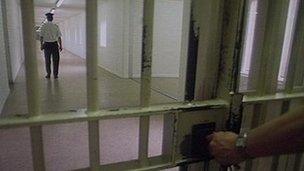Jails struggling to care for elderly, MPs warn
- Published

An increasing number of people jailed for historical offences, including sex offences, is partly behind the ageing prison population
Prisons are failing to cope with a rapid increase in the number of older inmates, MPs have said.
The rise is partly being put down to a rise in convictions for historical offences, including sex offences.
A national strategy was needed to provide for the needs of older prisoners, the Justice Select Committee report said.
Prisons Minister Jeremy Wright said a range of provisions had been introduced to meet older inmates' needs.
From 2008 to 2012, there was a 46% rise in the number of people aged 60 and over being jailed. Among those aged 50 to 59 there was a 45% increase.
Committee chairman Sir Alan Beith MP said: "Older and disabled prisoners should no longer be held in institutions which cannot meet their basic needs nor should they be released back into the community without adequate support.
"In one case we heard of a prisoner who was a wheelchair-user being released from prison without a wheelchair."
'Ad hoc' system
He added: "Many older prisoners are currently being held in establishments that cannot meet their needs. The lack of provision for essential social care for older prisoners, the confusion about who should be providing it, and the failure of so many authorities to accept responsibility for it, have been disgraceful."
Older people are the fastest growing group within the prison population. This was said to be partly down to longer sentences but also more prisoners are being convicted and sentenced to custody at an older age - including for historical offences, such as sex offences, that took place 20 or 30 years ago.
The committee's report found that while there were cases of "excellent" officers and charity workers providing social care the system was too "ad hoc" and too often older inmates were having to rely on the goodwill of officers and fellow prisoners to fulfil basic needs.
Responsibility for adapting the environment for older inmates lies with the jail's senior management team and the National Offender Management Service (NOMS).
The report recommends that NOMS should carry out an analysis of institutions to determine which are unable to make the necessary adaptations - and that elderly prisoners are no longer held at these.
It also said that health and social care needs should be assessed for prisoners who are either elderly on entering prison or grow old whilst there.
Sir Alan said: "It is inconsistent for the Ministry of Justice to recognise both the growth in the older prisoner population and the severity of their needs and not to articulate a strategy to properly deal with this."
The Prison Reform Trust backed the report - but said the solution lay in separate, secure homes for the elderly.
"Caring for wheelchair-bound, doubly incontinent, often demented people is beyond what we can reasonably expect of prison staff," said director Juliet Lyon.
Noel "Razor" Smith, a former prisoner who has spent more than 30 years behind bars, said there is less emphasis on readying older prisoners for the outside world.
"For a start, a lot of older people in prison are in for historic sexual offences, so they don't get much sympathy. But prisons were also built for young men and few have had any real changes since," he said.
"They do not get the care they need. They are the forgotten section of the prison system."
- Published20 March 2013
- Published14 May 2012